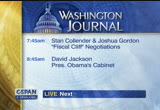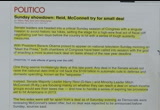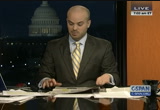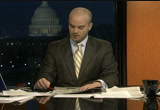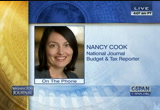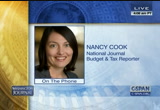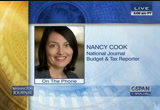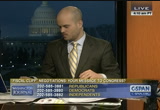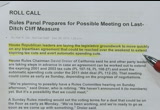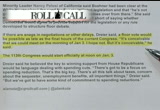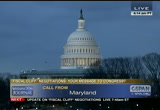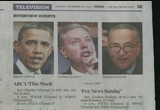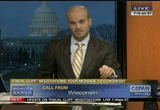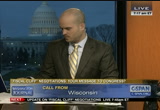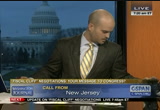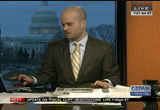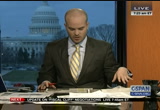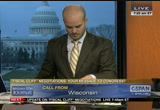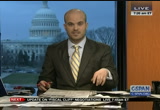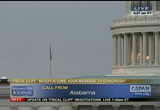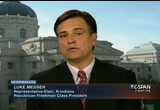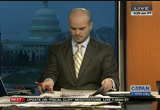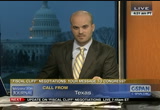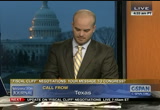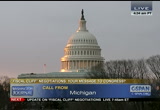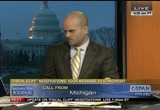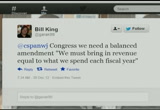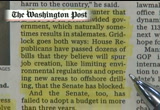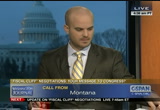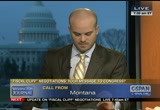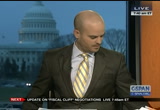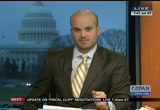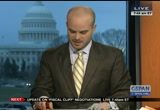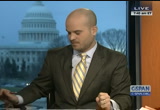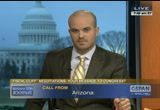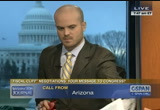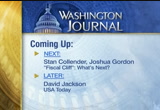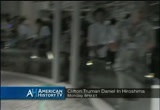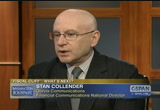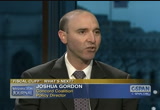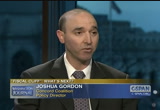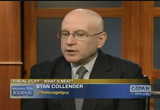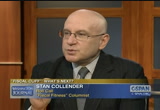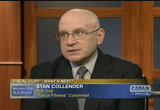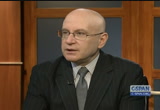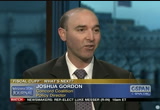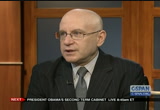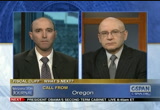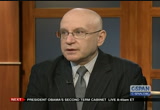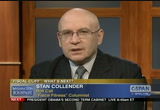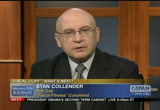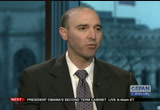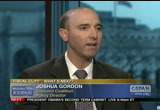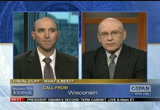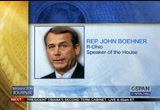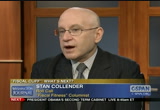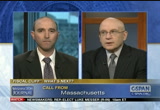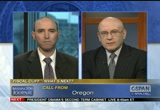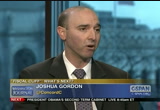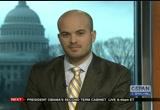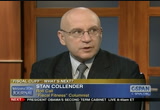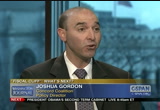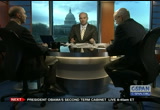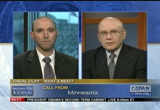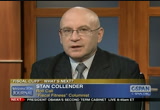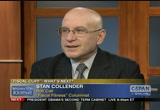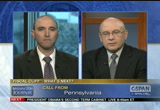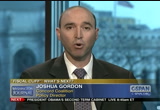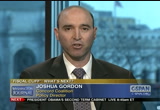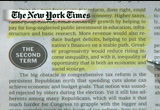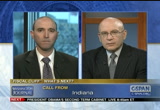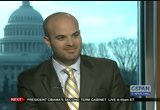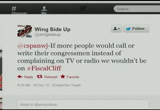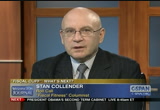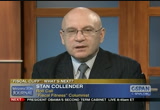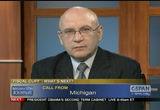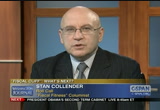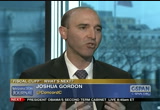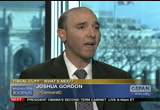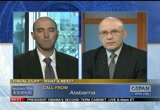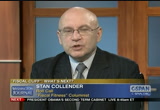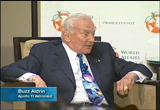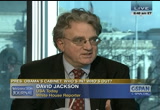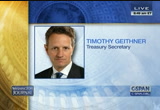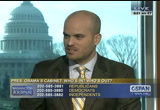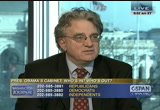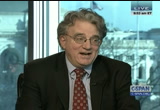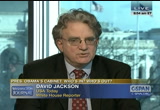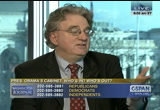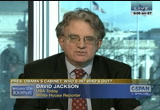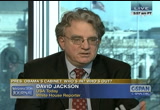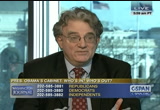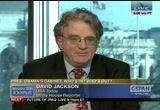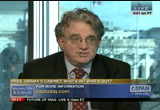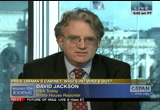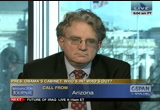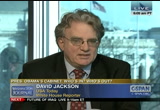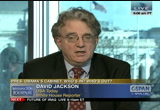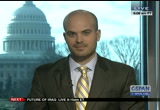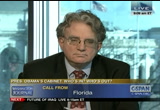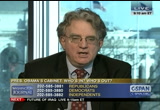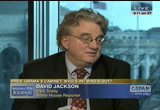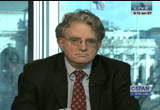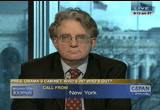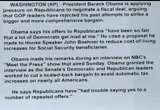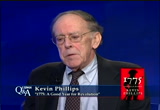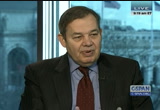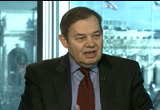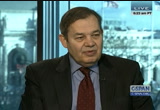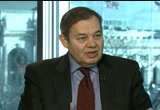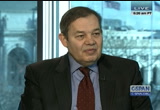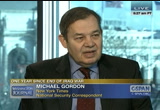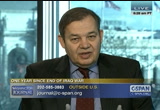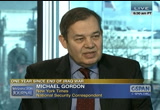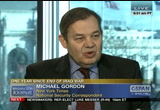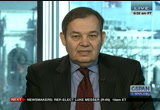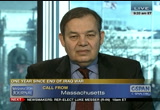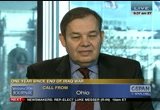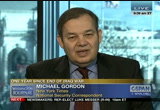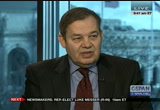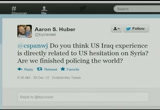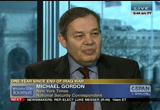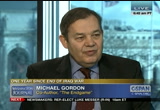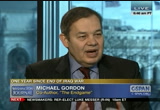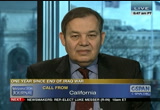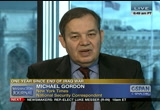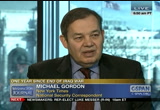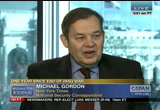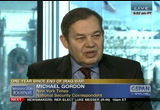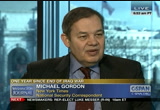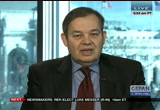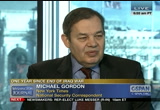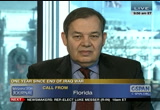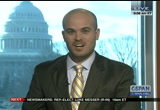tv Washington Journal CSPAN December 30, 2012 7:00am-10:00am EST
7:00 am
at president obama's cabinet for his second term. our guest is white house reporter david jackson. been a look at what is next for iraq with my coat -- then a look at what is next for iraq with michael gordon. ♪ host: good morning. it is sunday, december 30, 2012. we are less than 48 hours away from going over the fiscal cliff leaders have been working for the weekend to craft a compromise that can be agreed to before midnight tomorrow. it is now all but certain that any deal will be a far cry from the grand bargain that many leaders once imagined. as we take you through all the latest on the "washington journal," we would like to hear what you would like to say to congressional leaders on this
7:01 am
11th hour deal. what tax and spending issues do need included in any compromise. republicans, your number is -- democrats -- independents -- if you are outside the u.s. -- you can also catch up with us on all your favorite social media sites, twitter, facebook, or e- mail us. a very good morning to you. taking to the latest headlines on the fiscal cliff. i will run a few -- through a few of them for you. from "the daily news" -- also "l.a. times" -- i will take to "a "boston
7:02 am
globe"" -- "the boston globe" -- the new york post -- the story i want to start with this morning is from politico. that line is -- senate leaders are headed into a critical sunday session of congress with a similar mission to avoid historic tax hikes, setting the stage for a high wire a final act of fiscal cliff negotiating just two days before the country is hit with a series of tough austerity measures. --
7:03 am
7:04 am
7:05 am
at 2:00 p.m., the house reopens. -- tonight or tomorrow, on monday -- that is our schedule, the fiscal cliff count down today. i want to turn out to nancy cook of the national journal. she is here to give us -- give us all the latest. her latest story -- and the cook, thank you for joining us. guest: thank you for having me.
7:06 am
we are at this late hour. all of these tax hikes and spending cuts are slated to take defect in the new year. congress and the white house had spent seven weeks of bickering over all these different elements of the this clip. as you know, there are many elements. many tax provisions, a lot of spending cuts, and at this point, any deal that is reached will not deal with a lot of these things. it is going to potentially make some tax cuts for below $250,000. it will potentially patch the alternative minimum tax. it will not deal with the payroll tax holiday. the most likely will not deal with the sequester. it may earn -- it may or not deal with tax breaks for businesses. for all these arguments and ongoing things about these tax and spending issues, in the end,
7:07 am
we will get any compromise, if at all. host: we hear about the flurry of proposals that happened yesterday. any details that emerged from that that will tell us more about what we might be fighting over at the end? is it just numbers in terms of tax brackets, were specific tax proposals? guest: believe what the two are fighting over is the threshold of the tax rates -- who is wealthy? people who make over $250,000 a year, or should that number be higher, $400,000, $500,000? another big sticking point is the estate tax. this has received a preferential tax rate dating back to the bush era tax cuts. it was extended again two years ago. that is the real sticking point. it divides the senate democrats.
7:08 am
there are a number of senate democrats up for reelection in 2014 that not want to see that tax rate rise. that is a political football here as well. host: as we are in the final hours, what is motivating congress more, public perception, the stock market's? guest: i think it is both of those things. the stock market, all of the analysts i have talked to, they built in a certain amount of time to give congress a face to work this out. increasingly, there is concern that if they do not work this out, the markets will react. particularly kagel we go over the cliff and there is no game plan to resolve those issues at some point and we come up against the debt ceiling. you cannot underestimate the importance of public opinion. neither side wants to get blamed for this debacle. that is in the back of people's
7:09 am
minds. perhaps it is better to cut this small deal to show americans your doing something, congress and the white house are not completely dysfunctional. host: nancy cook is the budget and tax reporter for the national journal. how soon and we need to resolve some of these other issues in 2013, when we talk about the debt ceiling, arguments over the sequester? guest: we will hit the debt ceiling on december 31. tim geithner recently said that. the treasury department will take some extraordinary measures to extend that. that will last about two months. we have a little bit of win room. -- wiggle room. there will be a new congress in place. some of the faces will change, but it will be ongoing and
7:10 am
probably something that is dated from mid january to mid february as they look to cut a deal around raising the debt ceiling. host: nancy cook is the national journal's budget and tax director. , for joining us. we're taking your calls on the your message to congress as we near this fiscal cliff the line. if go to indiana on the democratic line. jay is waiting. caller: good morning. and, for taking my call. -- thank you for taking my call. i feel like our americans are politicians bosses. the government gets the money from us. i do not see how they have the right to sit there and play politics with each other and try to make decisions that are going to just benefit them.
7:11 am
maybe a small part of the population. this is the united states. we're supposed to be tried to help everybody. we cannot be scared of what is clear to happen to us when many people are barely able to meet their bills. they may have to be afraid of what is going to happen to them. what kind of government would do that to their people? they should try to make us feel calm. like we are really going to get something done. host: from crawford, indiana this morning. on twitter -- another tweet i want to read this morning --
7:12 am
7:13 am
7:14 am
good morning. caller: i have been listening to c-span radio for a while. i did 11 years in prison. i did not start learning about politics until after 9/11. i learned a lot about it because i did not know anything about politics. host: what would you tell members of congress today as they are debating this final deal? caller: i would tell them that i think is funny how the government is occurring, as the lady said at the beginning of the show, over other people's money. who gives the government, democrats and liberals, obama, or anybody who has the right to decide when another american is wealthy? in the constitution, it is said that we have the ability to
7:15 am
pursue life, liberty, and the pursuit of happiness. all this bickering is restricting and punishing achievement. i make next to nothing because of my past. i did my time. i do not care what they do. personally, i hope nothing happens, because i know the game. right before the deadline hits, they will pass something. i have been watching this for enough years to see that they will pass it. it will pass something because they have to play this game. host: charles from maryland, thank you for the call. trawls brings up a rebel. he will be on meat -- "meet the press" this morning. the highlight will be president obama on nbc's "meet the press." on abc this morning, senator chuck schumer. along with jon kyl of arizona.
7:16 am
on cbs, dick durbin and tom coburn, the republican from oklahoma. fox news this morning, on fox news sunday, senator lindsey graham, the republican from south carolina, on what senator dianne feinstein, democrat of california. it should be a busy morning on the sunday shows. back to your calls. june is waiting from wisconsin, on the independent line. good morning. host: good morning. first of all, shame on a congress, particularly the republicans who have just wanted to does -- to destroy this country. the tea party, i am so glad i am able to say this, the t stands for treason, because they have done all they possibly can to ruin america, to overthrow our government. host: can you take us through the next 48 hours on this debate
7:17 am
on the fiscal cliff? what needs to happen? caller: ok. i say, the president should be willing to come up to $300,000, as far as tax increases. we need revenue. $400,000, some people make that. we need revenue. the only way to get it is to get it from people who actually have the money. there is no shame in helping our government. this is our government. the republicans need to understand that social security and medicare -- listen, those are so important. people are talking about i do not want children paying the bill. they will need social security as well. i want republicans to realize that they were elected to do the
7:18 am
will of the people. not just the three% or whatever. they all need to understand that we are all affected by their thinking -- the president won the election, right? host: thank you for the call. i want to take you through some of the effects, if we do go off the fiscal cliff, if congress takes no action. this is the chart from the new york times of what will happen immediately and in the next couple months. in terms of the immediate tax increases, the payroll tax rise of 62% from four 0.2% and workers first $113,000 of income. capital gains, qualified dividend's, and estate and gift taxes are subject to higher taxes. higher earners face new taxes under the health care law. within the next couple glock --
7:19 am
a couple of months, the bush era tax cuts that have been debated over -- the bush-era tax cuts on income expire december 31, workers will not fill the impact until the treasury releases new withholding instructions. alternative minimum tax -- the charred talks about spending cuts, immediate and in the future. and it refers, payments to medicare providers would fall by 27% if there is no action. extended unemployment benefits expire for about 2 million people on january 1. to be the $110 billion in automatic domestic and military spending cuts known as the
7:20 am
sequester. in the next couple months, the march 27, a six month extension of the temporary assistance for needy families grant program expires. domestic and military agencies have until the end of the fiscal year to put all of their spending cuts in place. -- ha a few of the changes set to hit. tustin, what is your message to congress amidst this debased? caller: my message is that a bill that have introduced, i hope that they tried to stop trying to fight each other and try to come together to move the country forward and pass whenever bill is necessary so we can avoid this fiscal cliff. if we do not do that, it will
7:21 am
result in the economy, a tepid recovery we are having to go into recession. we do not want that. host: thank you for the call, justin. a few comments on our facebook page -- we are taking your calls and tweets and facebook messages all morning on this segment and the next segment about the fiscal cliff. we will go to franklin from georgia on the democratic line. good morning. caller: good morning. i like to tell congress,
7:22 am
congress is a mano kolinsky for the lobbyists. we have to deal with that. -- monica lewinsky for the lobbyists. we have to do that. they are putting money in their pockets so they can take vacations and revitalize their homes. host: do you think this fiscal cliff nonsense is to make more members of congress money. caller: yes. anytime you can say that corporations are people, you have already gone against -- i am talking about what the forefathers said. when they said that liberty and pursuit of happiness -- the two- party does not -- the tea party does not want to make the pursuit of happiness for everybody. that is why we have a problem.
7:23 am
the two-party -- tea party was put on the americans, the same thing in the native americans. making somebody else look like he did something that you did. you either stand up and make this country what the forefathers said it was supposed to be, or we need to take it -- we need to take this thing down under the ocean and drown it. put a bullet in it. host: john from georgia this morning. i want to go for it -- go to john from north carolina on twitter. he writes in -- we are talking about the sequester this morning. this story is from "the washington post specifically on the sequester --
7:25 am
7:26 am
went to the rich. no. the claim that if support, the middle class do not get the tax breaks, we'll go over the fiscal cliff. is it all going to the rich or the middle class? host: joe, do think the country should go off the cliff? are you particularly worried about what happens come january 1? caller: there's no doubt the president wants us to so he can get all the money. that is what it is all about so he can get more money. why would he be concerned? host: do you think there are any progress that should definitely be -- deftly be taken care of before we go off the fiscal cliff? caller: we are not going anywhere. all they do is take more money from the people. host: joe from chippewa falls this morning. i want to go -- go to patrick from montgomery, alabama. good morning. caller: good morning. i am the one who says that congress should close shop.
7:27 am
the fiscal cliff is an arbitrary, man-made slope. i think the government has got to cut spending. the government is taking 56 cents off my great- tondchildren's credit card pay for social security. i think we have a spending problem. i think obama and the democratic party is pushing the buss over the cliff. i think congress should get out of the way and let them push it. we should have a rational negotiant. -- negotiation. i think senator reid should get a vote for congress. that is about all have to say. host: patrick from montgomery, alabama. a republican from indiana and
7:28 am
incoming republican freshman class president was on with us on a "newsmakers." i want to play you a piece of him talking about the involvement of newly elected members. >> how involved are new elected members? a house republican conference has been holding conference calls. are you guys on the calls? or do you guys not get anything until january 23? >> it varies. we are not on every conference call. we were certainly there while you were there for orientation in the first part of december. we have been briefed on many of the policy proposals. we are being kept abreast, but i would tell you, it is not quite like being a member of congress. host: that was congressman
7:29 am
select "master. -- luke messer. we are taking your calls this morning and facebook messages. patricia rights in -- i want to go to don on the republican line from california. good morning. caller: canyon me? merry christmas, happy here -- happy new year. that last call shows you that the policy to win by dividing the country and making it us against them, the 47%, they are angry, they want your money, it is amazing. indeed to pass an exemption, all government trouble is not to be paid for with the tax exemption.
7:30 am
amend the code says that anybody traveling for government purposes pays for themselves. that is obama and the $40 million worth of vacations. it is amazing. you heard the caller from georgia a comic that they are angry and they will write. you can see the country is being run by an amateur who does not know how to negotiate, he cannot write something on paper. anybody in college in 101 knows that you need to negotiate in a fair minded way. he is out to ruin the country. listen to his agenda. host: do you think compromise can be reached in the next 48 hours? caller: the answer is no. they want the retina. they are getting the money from the people -- they want the revenue. they are getting the money from
7:31 am
the people. the government, in 10 years, in -- they have not cut anything. people are paying additional taxes, they are cutting back on their budgets. the government cannot keep spending money. we need a vacation for michelle and obama. stop that. let's have them pay their own after a share. that applies to lobbyists and anybody traveling for private reasons. this stuff is being run by amateurs. i thank you so much for being able to talk to you. we have a class warfare. it is not right. everybody should go to church and say a prayer to god. host: dawn from california. -- don from california. a column from washington times
7:33 am
congressman darrell issa in "the washington times." will go to the democrat line, charles from texas. caller: first, i have a question. this morning when i was watching the news, did i understand that congress is getting a raise next year? host: we will have a story on that later. caller: i think they should lead by example. they need to take a pay cut if we are taking pay cuts. we need to stop foreign aid all the way around. host: will that be enough to solve the debt problem? caller: know, there needs to be tax increases and spending cuts, but i do not think it has to come out of social security and medicare and medicaid. i think foreign aid and whistle spending, and i also think --
7:34 am
wasteful spending, and i also think that tax breaks are an entitlement because nobody gets them equally. host: i want to go from mike -- go to mike from the independent line. caller: i would like to say that this fiscal cliff is a charade. it is promoted by the media. it has nothing to do with fixing our economy. the president has had an opportunity to go to the g-7 or the 20 and explain that western civilization is in debt so far that it is never going to get out of it unless we abandon these world trade rules, everybody go home to their own country, and do with the need to
7:35 am
do to get back on the even keel with their financing. host: are using the u.s. should pull back from its international commitments and focus more on -- more on home? caller: i would suggest that other western countries do the same thing. the president should have his staff identify the most labour intensive products that we purchased here in the u.s. and stop importing them. he should say, for example, the automotive parts and automobiles -- six months from now, he should say, we're not going to allow any imports. the creek investors -- greedy investors will go to work and start making plans and getting
7:36 am
plants to fill that void. by that time, i am at number two with the heaviest labor, he should stop the import of that. pretty soon, we will get back on our feet. we need to build revenue from the value we make here. we need to make things. all the service companies, and the media, and the government, they are on the brink. we need to put some value into products and sell them here. host: mike from michigan offering his remedies to help fix the situation in the country. here is built king's take -- bill king on twitter.
7:37 am
7:38 am
in today's washington post. it's good to jump from antenna on the republican line. caller: good morning, america. balancedalking about budgets and all these different things that we should be doing to help the country. i believe that the pier problem is the federal reserve. any country that has had a central bank and up failing and collapsing. we are no different than any other country. the loan us money and interest and we cannot pay it back. we have been doing that since around world war room one. host: regardless of what happens in 48 hours in the negotiations, you do not think we are dealing
7:39 am
with the real issue? caller: yes, sir. we have to go back to american banks, not a central bank. until we do that, we will end up and voting on ourselves. it would be better to do it now and then to keep doing it and siphoning the american people's money and having the collapse. much like new zealand -- they had the same problem. they put all the bankers in jail and the corrupt politicians, and then they fixed the government. host: jim from montana offering his take. paula curry writes in --
7:40 am
i want to go to manitoba, canada, daniel is waiting to offer his take on the west fiscal cliff negotiations. caller: good morning. i wish a merry christmas and mary new york -- happy new year to all americans, i wish all of them happiness, health, and good things. what i want to say to all the people of america -- at the time
7:41 am
of the hostage situation in iran, i worked there until two weeks before that disaster. i was also a victim of that. i was for many months in the hospital. i follow always america everywhere. i appreciate how you people work together and make america number one. host: do you think america's working together right now in this fiscal cliff negotiant that is causing friction in washington? caller: absolutely, it is so beautiful to see. they are doing their best. i am not there in the party, but i want to read about the differences, why america is america, and why not it is not -- why it is not other
7:42 am
countries. i have lived in other countries for months and years. i make plans for education in 2001 for the dutch government. i always follow something for inspiration. i saw last time that the democrats and republicans, the parties, they are working so good together to make something happen. host: you think the fiscal cliff debate is a good sign for the country? caller: absolutely, it is a good sign for the country. you know, america does not need money. america is money. america needs jobs. what kind of jobs? american jobs. what is on american jobs? to do the best and to bring the
7:43 am
best things. that is the mayor, -- the america that i see. i seek some unity. i travel around the world. i see some the young americans everywhere. they become the best. host: from manitoba, canada, thank you so much for calling in. a few other stories we want to run through for you -- we will continue this discussion into the next segment. here is the story on federal workers getting a pay raise --
7:44 am
7:45 am
that is from the daily news this morning. i want to get one more call from walker from arizona, the democratic line. walter, what is your message to congress? caller: good morning. thank you for the opportunity to be able to speak on c-span. i'm getting up there in eight, and one thing that concerns me
7:46 am
-- two points. i have watched for the last 30 years, and i wanted to pinpoint the core of the problems we're facing. the u.s. is the greatest country in the world. we have the democratic and republican parties. when they were first established, they were established at a private association -- as a private associations. government is where the money is. the greed and opportunity factor has expanded every year, each and every year, bringing more money, taking more money. that is the first point. that is a big problem. it is accessing the till and the money that is spent. host: what is the second point you want to bring up?
7:47 am
caller: the government takes a little bit more every year. i study the gross income of government, local and federal. the combination of tax income, investment income, and enterprise in, -- as of 2007, all the governments were bringing more gross income and then the entire population of the u.s. investment income actually was greater than the tax income as of 2007. if the investment income, local and federal, was taxed as the private sectors was, they would generate some much revenue that there would be no fiscal cliff and the problem would be resolved. c-span had an excellent program on two weeks ago, the peterson foundation. they had alan greenspan and paul
7:48 am
volcker. they discussed the fiscal cliff, and both, they smiled and said, we have to create account -- a crisis to get everybody off their duffs. they said there was no problem with the debt and money. they know how much money is out there, local and federal. host: i appreciate the call, from arizona, and all the calls in this first segment. up next, we'll continue this discussion with a discussion with our sunday round table. later, david jackson, white house reporter with ""usa today"." -- "usa today." we will be right back.
7:49 am
♪ >> the release started to get worried in the summer and fall of 1774. the british admirals and generals and diplomats were reporting to the crown that the colonists were sending ships everywhere to try to get ammunition and muskets and cannons. this was after the british had sent more troops to boston after the boston tea party and signed the course of acts -- the coercive acts. maybe the colonists did not intend to use the ammunition. it came with an order from
7:50 am
council in 1774, it prohibited british ships from taking ammunition and everything to the colonies unless it was officially sanctioned. they were very alert to this. as soon as the colonies found out about council providing ammunition and munitions being sent to the colonies in new hampshire and rhode island, patriot militias took over and took the ammunitions and canons they could get. everybody knew it as coming in the winter of 1774. >> kevin phillips suggests -- suggests that 1775 was the critical launching point of both the revolutionary war and american independents. that is tonight at 8:00 on c- span's today." >> we had to make plans for the
7:51 am
invasion of japan without the atomic bomb. we thought it would cost 700,000 men, 200,000 to be killed and 500,000 to be named by life. >> as truman's grandson, a choose to honor both, both the sacrifice of american servicemen fighting their way through the pacific and of the little girls who died as a result of the atomic bomb. it is unimaginable what that most of them like to be close to the center where that fireball originated in the blast was strongest. >> follow clifton truman daniel on his journey to hiroshima. grandsondent's eldest joined us in washington to
7:52 am
discuss meetings with bomb survivors and the inspiration for his trip. that is on c-span 3. "washington journal" continues. host: our topic is the fiscal cliff. as we have done for the past several sundays, we will come joshua gordon and stan collender. thank you for coming back. stan, as we stand on the edge of the fiscal cliff, is there any chance we do not go over? guest: is pretty small. we are relying on a set that has been dysfunctional to come up with a disagreement to avoid a filibuster. then we are relying on house that could not take the lead and somehow we were expecting them to follow. it is important to state that
7:53 am
while the official deadline is the 31st, the truth is that congress can continue to work until it goes out of business. we've got about three days to get this together. host: joshua gordon, are we going over the cliff? what does it mean if we do? guest: even able to reach a deal, we are going of the cliff. the contours of the deal they're talking about, it will still be a lot left for future decision making. given if they are able to extend tax cut for the middle class and they do not do much of anything else, we have still got off over the cliff. we have sequestration, haphazard dealmaking that is not touching the issues that the parties said they were concerned about leading to the fiscal cliff.
7:54 am
you have the payroll tax cut that will expire, and nobody is talking about extending back. that is one that will give it the biggest bang for the buck economic allies. it helps americans the most. host: come out of the cliff are we cutting off, and how much will it -- and how much will we be going off? guest: you're staring at 1 cliff surely, that is 2% of every wage earner but to every $110,000 or so. that will have a pretty dramatic economic impact. beyond that, you'll be approaching a debt ceiling cliff which is another standoff. i assume that is where we will get most of the discussion on spending cuts. that seems to be absent from whatever deal they will be talking about. guest: another way to think about it -- if there is no deal at all, the $600 billion in
7:55 am
cliff-related tax increases and spending cuts, if they have some kind of deal, we're talking about $200 billion or so. what we're talking about here is probably the wrong fiscal policy given the time. something in between that, maybe the minimum of $200 billion and the maximum of $600 billion. host: -- what brings up a temporary payroll tax cut and what happens if it is not extended. several charts from "the washington post." how it affects you and your income brackets. for the richest 20%, when the payroll tax cut, with it not been extended, they would see an average increase of about $2,000 in taxes owed for the next 20%, those making 64 cars a -- $64,000 and above, about $1,100.
7:56 am
those making $20,000 to about $40,000, about 360 four dollars. -- $364. for the poorest, about $120 in additional taxes owed. stan, going back to one of your comments about relying on the senate, you write on a blog. a headline for one of your latest posts is -- guest: there have not been enough votes to get a budget approved for four years. that is number one. number two, they have had more filibusters, more requirements for supermajorities than in the history of congress or at least in any recent history. at this particular moment, with
7:57 am
time running out, with the guilty of any one senator to filibuster, what they have to do is to get an agreement that is not filibustered. that to get an agreement that everybody says, ok, we'll get a simple vote. that means any senator can get up and stop this from happening. think about some of the senators were talking about. senator jim demint, a tea party favorite from south carolina, is retiring at the end of his term. he is going to head the heritage foundation. it might be good for him in his new position to be the person to stop the tax increases from going into the fact. -- into effect. is not like he is going to do it. but that is all it takes. guest: there is precedent for it.
7:58 am
in the august debt ceiling crisis in 2011, the house approved on well in or unable to act. it was a deal with senator reid and senator mcconnell. it paved the way for the deal that actually lead us to where we are now. not saying that is equality deal, but it was located in the senate before -- a quality deal, but it was located in the senate before. guest: we ended up a fiscal cliff. that was not tax increase. if there is one thing that is important to republicans, it is taxes. this becomes a much more sensitive issue especially in the current environment. the debt ceiling, that is also important to the republican base. host: we are taking your calls and questions with stan collander and our other guest.
7:59 am
the numbers are -- right before christmas, the president told everybody to go home, drank some eggnog, take a breath, and we will come back and talk about this. how much movement did that stepping back give us? did it move anything at all? guest: it did not seem to change anybody's opinion. we have lost a few days. everybody is feeling more pressure to get back and do something. it did not change the basic spirit did not change the politics very much. part of this is that we have not gone over the cliff yet. a lot of the tax increases your mentioning. a lot of the tax -- a lot of the
8:00 am
spending increases -- cuts and tax increases have not happened. people need to go to the senator and representative and say, make these things stops. that pain has not happened. callers are angry about it, but they have not gone to their representatives. host: talk about how the stock markets have reacted over the past week since you have been in this chair. guest: it seems that stock markets are reacting to every utterance of senators, but i think it's a big problem. if you react to the utterances of the politicians in any kind of market sense, then you're losing. if senator reid says something and speaker boehner says something else, nothing fundamental has changed. white stock investors are buying and selling based on political
8:01 am
speeches is beyond me. host: what index will you be watching? here is a headline from the wall street journal -- what index will you be watching? guest: think consumer confidence is the big indicator. there are a number of ways to measure it. if you go back to the august debt ceiling deal, i think people did not even realize in washington, but you look at the data, he saw a major drop in consumer confidence around the time and it became clear that politicians were arguing and squabbling and were not coming to terms. i think that is a severe problem in this recession because consumer demand is not strong enough to propagate a strong economic recovery.
8:02 am
anything that dampened consumer demand is a problem. watching these politicians not getting together, even if they get a deal, the damage there is down. you see your leaders not being able to take simple steps. the deal they are talking about is identical to the deal president obama talked about the day after the election. the time in between has been wasted. guest: maybe they will be voting on a package academical -- the frustration is in your voice. i had a number of wall street clients. i can tell you from talking to them that there was a qualitative change in their tone and in their attitude about what was happening. host: you work as a financial
8:03 am
communications and national director. that is with corvis communications. guest: thank you for mentioning that. clients of thought there was something going to happen. that has changed. my only question is, what took them so long? the signs have been there all year that a deal at the end of the year would be more difficult. host: while we're talking about what we do, explain what the concord coalition is. guest: we are nonpartisan coalition educating the public about this responsibility and our fiscal challenges. guest: if we go over the cliff, it is not the end of the discussion. it is important that people not lose hope or assume that what happens on january 1 at midnight is the end of the discussion.
8:04 am
in fact, discussions will go on. i am sure that we do not have a deal by december 31, there will be one at some point in january. damage to the economy would be too great. public outcry will be significant. you asked about indexes. i'll be looking at the dow and s&p. those will get daily responses. host: we can get into more about those deals down the road. let's go to our republican line from oregon. caller: thank you for taking my call. to me, the fiscal cliff is just a small smokescreen. the fiscal cliff that is coming is obamacare. nobody is addressing obamacare. i had to find out friday that we will be taxed 2.3% on any device used in any medical field we go to. my husband is a doctor.
8:05 am
he wrote out a prescription for us for january, and he said, i do not know how much this will cost you a of pocket because of obamacare. he even said, my husband is over 70, he did not know how much water he would be able to help him because of obamacare. this is just a smokescreen. when people find out that not only will we be taxed on medical devices, but even our debt bills will be going up because of our animals -- this thing is a joke. you liberals out there, you'll be hit just as hard as the republicans. as the tea party warn you that this will happen. host: let's give the guys at the chance to comment on health care law and its place in this debate. guest: it is not part of the fiscal cliff. there is a tax increase because of health care reform act. it is not considered part of the fiscal cliff. the cliff has the potential, all
8:06 am
the tax increases and spending cuts, of doing a lot more damage lot more quickly. cook -- there are other parts, like coverage kids up to the age of 26. every time i watch -- what into the emergency room, i get angry about people who walk into the of emergency room and i have to pay for them. i talked to my doctor about this. the cost is something we all and the paying. -- end up paying. guest: let me say that if you are over 65 and you can get medicare, there should not be
8:07 am
any reason why your health care or what the doctor can do for you will change. even if you are concerned about the doc-fix, that will be taken care of very shortly. that is one part of the fiscal cliff that i am pretty sure it will be avoided before it affects medicare patients. guest: that may be one of the things that she was talking about. part of the fiscal cliff is that congress has not done the doc- fix, which is indexed the reimbursement rates on medicare. a 27% reduction and general one if it is not reduced. that means any health care provider providing health care to patients on medicare will have to reduce their services. it will be fixed or
8:08 am
attractively, if not before. host: that is the health care law, the charts -- "the new york times" talks about what happens immediately in terms of tax increases. they are talking about payments to medicare providers fallen by 27% if nothing is done in the fiscal cliff action going on. --, while i have you, i want your thoughts -- how much of that sentiment are you seeing out there? guest: a see a lot of it. as a grass-roots organization, we hear from people all across the country. we talk about reducing deficits and having a responsible budget for 20 years.
8:09 am
this is actually, it will you go over the cliff and nothing changes, the largest single day of the deficit reduction in world history. it is $600 billion in deficit reduction trust by the turn in the calendar. over the long term, you look at what that does, we are in much better shape over the long term by going off the cliff. the problem is that right now, we are still very slowly recovering from the worst financial crisis it had since the great depression. it probably is not the time to be having such large deficit reduction. that is why we and others have been focused on getting some kind of a larger deal that can ensure we do not have this extensive short-term deficit reduction.
8:10 am
if we start to deal with these problems now, we can do so adequately and without too much short-term economic pain and helping the economy. from let's go to patricia oak creek, wisconsin on the democratic line. caller: good morning, and happy new year to the both of you. i feel so sad for our poor country. congress is getting a pay raise? for what? what are they getting a pay raise for? i wish they would start being adults. they should think of the whole country. the tea party, ever since they got in, they are ruining our country. again, thank you for letting me
8:11 am
speak. god bless the both of you. guest: thank you very much. host: i want to take you to the cover of this magazine -- it has a list of losers, john boehner, harry reid, barack obama. it's a list of winners is blank. how does john boehner come out looking after what happened over the past four weeks? guest: it is hard to see anything positive. he took on the negotiants for the republicans. he failed to get his own house to come along. plan b, clancy, -- plan c, and now he is seated negotiants to harry reid.
8:12 am
-- negotiations to harry reid. it is certainly possible that he may have trouble getting reelected as speaker. he may get 20 or so to party boats to vote against them or not vote at all. i could stop him from being reelected. host: what are the pitfalls for harry reid and mitch mcconnell? guest: mcconnell is up for reelection in 2014. if he agrees with the white house on something, particularly tax increases, it will hurt him in his election. remember rand paul -- mcconnell has less room to maneuver. for harry reid, a lot of his reputation is on the line. can he put something on the floor of the senate that some democrats will support? guest: the biggest loser is the
8:13 am
unemployed and those trying to get jobs. that is what this is about. really, people need to step back and realize, while we are concerned about deficits, it is because it is a concern about the economy. there are different prescriptions for the economy at different times. allowing this recovery to slow down, even as it has already been anemic, would be a drastic abdication of responsibility by everybody in washington. that is not to say that everybody is equal to blame and this is something that washington does and be covered along -- that really is not always the case. in this specific case, you have our recovery, you have people ignoring what common economic theory would teach us to do, and using political grandstanding to ignore that economic theory. that is the problem. it hurts the american people,
8:14 am
especially those who are still looking for work, more than any politician. host: one of the biggest plusers is the defense and aerospace community. republicans were willing to throw them under the bus as part of the debt ceiling deal last august and now it looks as though the can you tell us are going to stay in effect. now, >> the sequestration cuts. >> so for the second time in less than a year they're being thrown under the bus politically. you have to ask whether their clout is as great as it used to be. >> also federal workers since it affects those, military spending and nonmilitary spend sng >> guest: sure. and it's not just workers. domestic agencies. but always looked up from now the republicans were willing to insistent on supporting lower taxes and higher defense spending and now being forced to choose between the two they went with the tax cuts. host: a couple tweets.
8:15 am
want to go to george from massachusetts on the independent line. caller: good morning, everyone. they're going to come up with a deal that they won't vote on until maybe january 4th or 5th so that way 95 or 98% can say they voted for a tax cut. that's all they're interested in. that way when they run for reelection they can say they cut taxes. host: explain that a little bit more for us. why would it be a tax cut after the new year? guest: first, my wife is from needham so nice to talk to you.
8:16 am
here's what would happen. taxes will go up or the tax cuts already in place will not be attendant on january 1st. at that point congress and the president would have a chase to rei am pose the tax cuts that were there which could be spun as a tax cut relative to current law compared to now where it wouldn't be. george you may be right. it's certainly the spin is possible. but as you just suggested as we're now talking about, i think it's relatively easy to see through that. it be enough for people to be able to say i never voted for a tax increase. but somebody -- the grover no, sir quists of the world, are going to say that's the equivalent of saying you're just as guilty as if you voted for it. host: will people be able to see through that kind of congressional spin? caller: very few. and the politicians come back and tell grover he is got it wrong because the tax law on january 1, were the clinton era
8:17 am
tax rates and they voted to cut them. and grover can't argue against that because the law is the law. guest: i wish you weren't so rashal about things. that's not the way congress works. but maybe you're right . host: to denise on the democratic line. caller: i would like to make the point that we would all be driving electric cars which would get everybody a job the last 30 years if they didn't stop it because so many people are entrenched in oil and oil money. and if we would have more democraticically run businesses, which i do see in my home state happening more and more, i think that would solve a big big portion of the problem. thank you. host: what energy end of the year energy issues are we looking at here and which ones are likely to get punted down
8:18 am
the road? guest: that's a good question. i'm not sure what energy issues -- i'm not aware of any -- host: tax issues? guest: tax issues for the fiscal cliff. but going down the road you definitely have some issues. there's the need for a new highway bill, they've had trouble tasking the highway legislation because no one is willing to increase the gas tax. and our gas taxes are the main ways we pay for new roads and bridges and that kind of thing. so i think that's a relatively short-term problem. and then over the long term, which i've talked about here before, is that given that we're going to need some rev now help solve our future fiscal burden, one of the most sensible places to raise revenue would be through a carbon tax or something similar because that can also help us reorient our energy priorities to cleaner, less damaging greenhouse gases type of
8:19 am
energy. host: i want to note that you can go to the c-span fiscal cliff website to get all the latest information. you should be checking back over the next 48 hours as things develop. guest: big deadline this afternoon. they set a self-imposed deadline for 3:00. senator reid has said he is going to bring a bill to the floor that the president has asked for. host: is that senator reid's plan b? guest: it's clearly the fall-back. which is we're going to come up with, try to come up with negotiations but if not we're going to bring a bill to the floor. that's increase taxes on everyone earning over $250,000 eliminating the or fixing the amt for 2012 and i think extending not the payroll but
8:20 am
unemployment. so those three elements. at that point he would be saying to the republicans, look negotiate with me and we can get you something better otherwise we're going to take a vote on this. i would expect that to be the phil bustrd which plays into what the white house wants which is republicans taking responsibility from blocking that. >> if it doesn't, what incentrd is there for john boehner to bring it back? guest: that's a good question. he promised to bring up whatever the senate passed but he didn't say he was going to take an up or down vote on it. he said we might amend it. with this few hours before the start of the cliff and amendment process, bringing a bill back and forth would mean we're going over the cliff . host: from michigan on the independent line. good morning. caller: good morning. i have a couple comments. i think the members of congress and the the senate need to remember that we are their employers and they need to negotiate until the deal is done.
8:21 am
i don't think there should be no deadline. they should stay there until they cut a deal. and if they don't i think everybody today should call up their senator and members of congress and complain until they do. guest: interesting because constituents just reelected a whole bunch of members of congress. the chance to really send a message would have been about november 6th. host: what is more pressure here on members of congress is the constituents being upset? is it the market that is we were talking about earlier? what's going to be the pressure point here? guest: markets initially because that would be the way voters and members express thems but that's like a daily pole on how people feel. but trust me, that first weekend back if we go over the cliff and the markets have tanked, at that point they'll be hearing from their constituents. and a lot of members of congress i talked to are hoping that happens. they think that's what it will take to move the needle the
8:22 am
last couple of weeks we need the pezzents to storm the castle with pitch forks and torches. guest: we also should be clear that some of the entrenchability on the hill is because they are expressing the wishes of their constituents. i mean, i think the tea party group was pretty explicit about not compromising and they preferred that their members take stands on ideological positions and not compromise. that is how they felt they wanted to be represented. and so to some degree we have to honor that faithful representation of the constituents. the problem is that the system of government we have, with the house and the senate combroiled different parties, the senate with the bill fuster, our current institutions having that kind of ideological grounding from your members of congress makes it very difficult to pass legislation. and i think that's what we're seeing.
8:23 am
and it's something we all have to grapple with and think about our institutions of government, think about how we're electing people who prefer not to compromise. and then, in the next election, we either keep electing those people or we don't, or we push them to change some of the rules of the game so that it's not as hard to get things done. host: for those listening on c-span radio, we're talking with dan, a financial communications national director with corviss communications, and also a columnist for roll call and former staffer for a number of democratic members in the house and senate. and joshua gordon, concord coalition policy director. we're taking your calls and tweets and e-mails. up next, she willy from minnesota on the republican line. good morning. caller: good morning. i think some of the major problems that we have is we keep electing senators and congressmen who are not economists. so who really know nothing
8:24 am
about the economy but know a lot about the legal fin angling that lawyers do. making more policy to fix policies that end up causing more problems in the first place. that's number one. number two, we have so many in the media columnists, any news people, a number of those who are also not economists. they're not really understanding the issues at the core. and we do have a spending problem. and until we really come to grapple with that and we don't educate the people the spending is indeed the problem in -- then pain is going to have to come on our parts to really number one to spur job creation. because for every dollar you take out of the public and put it into the tax system, the government, you are taking out a dollar towards somebody else's getting a job.
8:25 am
and until we understand that concept, we can say oh but we want to help the poor. and capitalism is against the poor. but capitalism has freed and brought more people out of poverty than any other system in the world. so until there's some better system to help the poor, capitalism is the grand mother of them all at this point. but the further we are get away from that, this is where we're going to fall. host: maybe you want to respond to that. guest: i would be really nervous if we had a congress made up of nothing but economists. i can tell you that there's some things i know about and a lot of things i don't. and the world doesn't work just based on economics. number one. i want to push back on the idea that this is just a spending problem. two aspects of it. number one math matically you can balance a budget with
8:26 am
either spending more or taxing less or -- taxing more or spending less. or some combination of the two. and one of the interesting things -- noneconomics argument but important, is that the polls show that the average american doesn't want sputs. in -- spending can you tell us. no area gets the majority of support for cutting. none. that's number one. so one of the questions we talked about this the last few weeks, is are we going to keep the commitments we made and if so we need to tax more to pay or do we want to change those commitments from the past? the other thing i want to argue about is you kept using the phrase the poor. the truth is most federal spending goes not for the poor but for middle class taxpayers, medicare, social security, defense spending, defense jobs. this is really these are middle class programs and why there's such widespread support. guest: as i've said on a number of occasions here, you should
8:27 am
look at the federal budget as the government being an insurance company with an army. there's a fair amount of defense spending and most of the other spending is for two insurance programs, medicare and social security, which help really people of all income levels and mainly retirees. and so when we look at that rebalancing our long term spending commitments we have to do it with that understanding that foreign aid and welfare aid to the poor those are very, very small programs of the federal budget especially as you look over the long term. those are actually projecteded to shrink as a share of our economy going forward where as social security and medicare are projected to continue their increase and that's what we have to deal with. an issue some of our callers have brought up. we read a story about this earlier today about the 0.5%
8:28 am
pay increase that president obama signed. where did this come from and is it a good time for members of congress to be getting a pay raise? guest: no never never a good time politically. the truth is some of their expenses are paid for but it's an expensive job because you have to keep two residences. you end up getting some of the expenses. on a per hour basis you're probably not paid minimum wage. at the same time, when unemployment is 7%, it's never a good time to be showing constituents that you're giving yourself a pay raise. host: did this come out of the blue? guest: that's typically the way it happens. host: members of congress aren't trying to advertise? guest: when they've had big debates people vote against it. guest: i think there might be something where one congress has to do it before congress
8:29 am
ends the next congress can get it. but i'm not sure what exactly. guest: but you're exactly right. congressional salary increase during a lame duck session when no one else is watching is suspect. they should take responsibility for it. i can remember bob michael former republican leader in the house saying i'm proud of voting for this. if you want a two bit congressman vote for somebody else. he kept getting reelected. host: john now on the democratic line. caller: good morning. thanks for having me on. my main thing is saying i think the problem is our g.d.p. we don't produce anything. we don't create any jobs. as far as china is concerned, we don't tariff, we don't put that high of a tariff on their imports but yet i don't know the exact numbers but i believe it's a lot higher that they tax our imports in their country.
8:30 am
and the whole thing with jobs. he created the apple scommuret in california in his garage but yet when he got successful he moves all his company over to china, giving chinese people jobs. if steve jobs was born in china he wouldn't even have a garage therefore he wouldn't be able to create the apple computer. so i just think we just don't do enough for the people of this country. and the people who are in position to create jobs and do this do not reinvest in the country. therefore i don't think they should get tax breaks. if you want to give these corporate giants tax breaks then give it to those who want to invest in the country, who want to create jobs here, not overcease, and they think try to think of ways to get their money over there into here lower than say the american businessman paying 35%.
8:31 am
guest: i mean, i understand your frustration. i think part of it is that the corporate tax code is a mess. we clearly need to fix it in a way that a lot of the politicians talk about fixing it in a revenue neutral way which doesn't add anything to the deficit discussion. it doesn't help make lowering future deficits any easier. so there are some things we need to change about the corporate tax code but in general i think we need to realize that if we set our country on the right path making the right investments in technology and education and really making sure we don't cut the necessary programs that can help us do that growth and so we have to make them a priority and perhaps deprioritize other spending areas we will be able to grow with the global economy . manufacturing has already come back to some degree i know that apple computers are actually moving a couple production
8:32 am
facilities back to the united states from china. there's a real key is to make sure that we're continuing to invest in those types of investments and help us compete on a global scale. but we should also realize that it helps us when apple can produce their goods in china in a more cheap efficient manner than we could here because american consumers can get i pods and i phones on a much discounted basis from what it would be if we tried to do it all here. and so if we don't spend all that money on those i phones here that opens up a whole new industry of productivity. for instance, productivities is something people made a lot more off of in the united states than they would have if we manufactured the devices here so this interconnected economy really helps us. it's just a question of us being able to maintain our ability to invest in the things we need to keep our workers educated and make sure we have
8:33 am
technological advances in the future. host: you bring up reforms needed for the tax code in a continuing series on what president obama and congress should tackle in the next four years today. the "new york times" lead editorial is why the economy needs tax reform. that editorial today in the "new york times" if you want to check it out. we'll go now to linda from
8:34 am
indiana this morning on the independent line. caller: good morning. afe couple points to make. i can't understand why a handful of bureaucrats are able to control all the american citizens. i think there ought to be term limits. and if they don't do their job, instead of electing people why don't we throw them all out and appoint somebody and when they don't do their job they're the ones who get the pink slip. i just don't understand the way this economy is going. the e.p.a. is regulating and pushing through cutting down on energy, the poor coal miners, because they want that clean energy. we've got a plant right here not just a few miles from me. they burn clean coal. if i was in there, they would probably have me assassinated in a week because i would have a line item veto every bit of
8:35 am
pork barrel spending, their pensioning would be cut, their pay would be cut. they would have to have the same health care as what they should pushed down the american people instead of having a set of rules and laws for them and then the separate one for us. and when they raise taxes and stuff all it does is make it harder on the middle class because we're paying the way for everything. there is so much fraud in medicaid, medicare, social security, food stamp programs. i see it every day in the stores. and if they could cut down on the fraud that eliminates some of it. but the government is spending all the money before they even take and raise the taxes that they're going to draw in is already spent. guest: a lot of frustration there. guest: first, it's not always fraud and abuse. and you've got a deficit that's about $1 trillion and a budget about $4 trillion and 25% of the budget is not waste fraud
8:36 am
and abuse. we're not going to balance the budget with just waste fraud and abuse. what you're suggesting is changes in the constitution. so understand that as josh mentioned earlier, the elected representatives are largely doing what their constituents have asked them to do. it may not be exactly what you wanted the but the typical representive does a pretty good job in voting the way their constituents want them to vote. the country is incredibly divided not just inside the beltway but outside the beltway and that's what you're seeing reflected in these very, very difficult votes on anything having to do with the budget particularly with taxes. guest: but we do like them calling in. host: we want everyone to call in. we go to teresa on the republican line. good morning.
8:37 am
caller: good morning. i would just like to talk to stan a little bit about the fact that steve said something about the one republican senator that likes to filibuster and blah blah blah. what about harry reid pocket vetoing everything that comes from the house if he doesn't like it? how is that -- that's not even written into the constitution but the filibuster is but harry reid can decide i'm not going to take this up but they can't filibuster? host: we'll get the response. guest: no that's not in the constitution. it is a prerogative that the senate has taken on its own as it created its own rules. but it is not constitutional. and just to correct you with one other thing. it's not a pocket veto but that's something only the president can do.
8:38 am
but you're right in the sense that the majority is the one that determines what the agenda is going to be, what legislation comes to the house. it's not different in the senate than it is in the house of representatives. where john boehner the house rules committee decides what will come to the floor and when. it is -- you've just saw it as a matter of fact in the house with the unwillingness of john boehner to take up the senate-passed bill on extending tax cuts on those earning $250,000. so this is not anything new. this is long tradition in both houses. it is coming to the floor now because you've got a split congress the two sides aren't working together the two parties aren't working together. but you're exactly right. this is an attempt for the majority of one house to thwart the majority of the other. both houses are frustrated. caller: i agree with his
8:39 am
explanation. but if everything comes across to harry reid and he doesn't bring it up for a vote, then my senator debbie stab now who claims a to be a spall business backorer doesn't get to show her cards. so i have to believe the commercials that she put out to get herself reelected but then she never gets to prove herself ptf. and that's what i'm concerned. my brother works for the uaw. he makes the same amount of money that i do. he pays about three grand in taxes. i pay 30. and now the government is asking me for 40. how is that fair when we make the same amount of money but my business makes way more than 250,000? now, but i get charged at the rich man's rate. how come i don't get charged at
8:40 am
the uaw rate? guest: tax law is complicated and complex. i'm not going to try to defend all of it. as a small business person you're getting taxed on the profits you earned not on the total amount of revenue that you bring in. so if you've got a restaurant that's earning that much money, that is you actually get profits of that level first congratulations most restaurants don't do that well. second you should be proud of the job you're in. and third it's a little frustrating, i understand that. but that's -- so i can't really defend thed to. i can tell you that just because your senator doesn't get to vote on every bill that doesn't come from the house doesn't mean she's not representing your interests. there's work behind the scenes that gets done. so don't think that she's not busy. just that she's not voting specifically on some of the thing that is are coming over from the house of representatives host: tell us about the debt ceiling issue.
8:41 am
it looks like it's not going to be something dealt with this week. what is the time frame for dealing with this issue? guest: the treasury secretary suggest that had they have about two months. we're going to hit the debt ceiling in the next day or two but then he has about two months where he can shift things from different accounts and make sure that we can continue to borrow money on the open market and after the two months we won't be able to pay off the bonds that we have and so then we reached this kind of crisis point. where really i think people grossly underestimate how damaging that would be. probably world financial markets would come to a halt if for a day or two even we weren't able to borrow on the open market because our treasury bonts really make the whole global market work. so it's really this very hard ceiling. much worse than the fiscal cliff in the sense of its capacity for economic damage.
8:42 am
but also it's one of those things that is in our current laws that doesn't really make much sense because the debt ceiling doesn't mean members of congress are going to be agreeing to incur another trillion or 2 trillion dollars worth of debt. all it does is allow us to borrow for the decisions that have already been made by past congresses. so when a past congress does a spending increase that is destined to increase the chances we have to borrow more. and so the debt ceiling is really not a break or a statement on past or future policy. it's simply something that's allowing the economy to continue to move and that's a problem because it's kind of unusual that a country such as ours has to have a device where congress ultimately has to allow the treasury to continue to borrow. guest: if there's one change i would like to make in federal
8:43 am
budget process is that when you vote for a tax increase -- tax cut or spending increase, you also have to vote to increase the amount the government has to borrow to finance that. that is, it's immediate. so you don't get a free vote. you don't get to vote for a tax cut or spending increase but not admit that you're increasing the debt at the same time. host: let's go to montgomery, alabama on the democratic line. good morning, jean. caller: good morning. i just want to say that i wish that c-span or someone would give us a published list of the names of the congressmen that won't help the american people. it seems they're afraid of grover nor quist and the tea party. but they should be afraid of the voters. also, it was mentioned earlier that congress is getting a pay raise. they don't need a pay raise. they're making $174,000 a year for saying no to everything that helps the people. their salaries should be withheld until they do help us.
8:44 am
guest: thanks. happy new year. you said something very interesting to begin with. that is, we should get a list of all the people who are not wig to help the american people. you need to understand that for some folks voting for a tax increase is not helping the american people. for other folks not providing a tax cut is not helping the american people. so your definition here is not universally accepted. and that's the problem. as i travel around the country i can tell you it's not a question of texas versus new york. it's a question of houston versus dallas in terms of differences in what people want and what people are willing to accept. what people think is the appropriate course. even on the last couple of calls we've had someone say we've got to cut spending. someone else said we need more revenue. and if you look at the polls when it comes to the budget everybody wants the government to do just what it's doing now they just want to pay less for it. that's a good trick if you can figure it out.
8:45 am
host: gentlemen, thanks so much for joining us this week. and all our information can be found on c-span's fiscal cliff website. up next we'll talk about the president's cabinet and who is in and who is out. and later it's been over a year since the last u.s. troops withdrew from iraq. the we'll ask michael gordon what the status of that country is today.
8:47 am
>> a lot of people that i know looking back on the last 40 years will say that ever since apollo the space program has been a job program. how many jobs can we get in your district, in your state? the space shuttle passed by one vote because it was passed all around the country. we had people working in different places. i can tell you some pretty brutal stories about the politics that get involved in our space program. and it's bring home the bacon. and the bacon is jobs because jobs get votes and votes keep a
8:48 am
congressman or senator in office. >> tuesday night at 8:00 apollo astronaut buzz al ridge. followed by a debate on responding to a nuclear iran. and polling in the 2012 presidential election. tuesday night on c-span. >> "washington journal" continues. host: u.s.a. today white house reporter david jackson joins us for a discussion on president obama's second term cabinet who is staying who is on their way out. and set the stage for us by giving a sense of what the norm is historically in terms of cabinet turnover for a president. >> there almost always is after the 19 96 election people left president clinton first cabinet. after the 2004 election there were people who left president bush's first cabinet. i must say the difference this year in those previous cases it was -- the month of december
8:49 am
was spent with people announcing their retirement and then there would be announcements. in this case we're still in the speculation stage. on the secretary of state hillary clinton and e.p.a. head lisa jackson have announced they are leaving. in terms of the rest of the members we're still in the speculation stage. host: we know two deaf nitswhofment are the likely expected to turn over? guest: almost certainly timothy geithner indicated he would leave. there's some uncertainty because of the fiscal cliff. he may extend his stay in orter to complete those negotiation but it's a virtual certainty he will be leaving. so speculation is alive who might replace him. and also leon panta will retire but the timing is uncertain. host: these are the big names of the cabinets and the big positions. anybody lower down the chain
8:50 am
expected to go? guest: a little talk about the energy secretary steven chu is thinking about it. ken salazar the interior secretary is also thinking about leaving and u.s. trade representative ron kirk is also on the mentioned list in terms of retiring. host: but none of those formally? guest: not official . host: has anybody said i'm sticking around? guest: that would be kind of unproforma but i think kathleen seebluss said she would like to stay because of the implementation of the health care law. no one announces that. they kind of get the word out there. there have been some talk about whether eric holder will retire but he told people he would like to stay for a year or certainly until september when we're likely to get a new f.b.i. director. host: if you're not leaving immediately at the end of the first term are you expected to stay for all four years of the second term or is there another dated where turnover occurs? guest: the way i understand it is if president obama has told people if they do stay he wants them to stay for at least a year because he doesn't want to
8:51 am
spend all of his time filling these jobs. so the rule of thumb is if people are still in place at the end of january they'll probably stay for the entire year. host: we're taking your calls and questions on this segment. the phone numbers are on the screen there. take us through the secretary of state position and the situation with u.n. ambassador susan rice. how has that, how has her withdrawal affected kind of what's going to be happening with that position in terms of nomination process? guest: very unusual situation. secretary of state clinton has been talking for most of the year about her desire to retire. and for several years those who cover the white house has
8:52 am
always been assumed susan rice would be a major candidate. and of course that's kind of what happened. host: but she was never formally nominated. guest: no she wasn't. president obama hadn't gotten around to it. the administration kind of got out the word that rice could very well likely be the nominee to replace clinton. once that hit the hill it started meeting objections. a lot of republican senators objected because of the benghazi situation. you'll recall there was an attack on the consulate on september 11th. initially the administration said it was because of an protest of an anti-islam film that got out of hand. that's what susan rice said five days after the attack. it turns out it was a pre-planned terrorist attack. so a lot of criticism over what she said immediately after the attack and basically republicans use that had to sink the prospect of her nomination. >> host: is it unusual since she wasn't formally nominated for
8:53 am
her to be the subject of floor speeches and committee hearings and her nomination being talked about so heavily? guest: it's happened before but not like it's happening right now. susan rice's nomination was basically sht down before she was nominated and we have a similar situation. talk of chuck hagel might be nominated. well, he has a lot of critics over in the senate too particularly among the republicans and they appear to have shot down his nomination. now it's considered unlikely. so he got preemptive nomination fights. and i think that's relatively new. >> let's stick with hagel. where did word of his potential nomination come from? where did it leak from? and -- >> host: guest: that's a good question. president obama said they don't like to talk about personnel. for one thing they don't want to embarrass people. when it comes out at some point the administration has to let people on capitol hill and
8:54 am
people around town know that certain people are thinking about the jobs, run the flag up the flag poll and see who salutes it. and hagel's name popped up and that's what start it had dam pain. basically the -- campaign. the administration tells people and that's how it gets out. host: what were the objections to chuck hagel? here's an ad in the "new york times" from the log cabin republicans. chuck hagel wrong on gay rights, wrong on iran? wrong on israel? >> those are the issues. chuck hagel was a critic of israel when he was in the senate. he was also criticized a nominee i think during the clinton administration, an openly gay nominee. i think maybe for luxen bourg and said some rather harsh things about that. another issue pointed out in
8:55 am
that ad was chuck hagel is more supportive of negotiations with iran rather than taking a hard line. all three of these issues have been the major points. >> host: so you say the trial balloon has been shut down? guest: all reading tea leaves. that appears to be the case. we just don't know. host: if not hagel, who? guest: the reason we think hagel may not be in such great positions is other names have surfaced. i don't think we know at this point. like i say there's also uncertainty when panetta is going to leave. he's a former chief of staff, former budget guy. so we've got pentagon budget issues coming up. so there's some talk about him wanting to hang on and try to manage the budget issues that
8:56 am
are going to hit the pentagon over the next few months. host: we're taking your calls with david jackson, the white house reporter for u.s.a. today. first up is doug from oklahoma on the democratic line. good morning. caller: good morning. i had a question about geithner. hadn't he said something earlier about wanting to leave? guest: that's correct. host: around the inauguration was the quote. host: how would you feel about geithner leaving? do you want him to go as a democrat? caller: that's a good question. no. no. guest: the caller is right. geithner has said publicly he wants to leave around the nomination. but with the uncertainty, i don't think the administration would want him to leave as long as these issues are hanging. so we get a fiscal cliff this deal and i think he's going to be gone by the end of the month but i think it's kind of up t
8:57 am
in the air. host: says a contender for his job would be jack lew. guest: that's the betting money. is his job if he wants it. and there's some question if he wants it. that's a big commitment. i think he would be expected to stay for the entire term. he has been a white house official throughout the time. so the question is if he wents to take it and if he wents it he'll probably get it. host: where did he come from before chief of staff? guest: he's been in government for a long time. he was the budget director for president clinton. he was on wall street during the bush. but he basically made his bones in the government. he was a long-time assistant to former house speaker tip o'neal. he helped put together the social security deal so he's been involved with budget issues for quite some time in
8:58 am
the 80s and 90s. host: christina next. caller: thanks for c-span. host: go ahead. caller: thank you so much for c-span. i'm having a problem because with all these comparisons with in the past with clinton and reagan and all, president obama has faced things that no other president has ever faced. two wars, deficits, financial meltdowns. and a communication no other president dealt with. they didn't deal with twitter and facebook and all the stuff and rumors flying around. and it seems these days everybody's got their opinion before anything is even formally done. host: amid all this who do you think has served the president best in terms of his cabinet? who would you like to see stick around? guest: i would like to see all of them stick around. but i think chuck hagel is
8:59 am
wonderful. i wish he would get in. but you've got everybody on that tv on twitter spreading rumors all over the place and nobody makes the common judgment any more. nobody listens to the facts. they listen to all the rumors before they ever hear facts. host: how tough is it to be a nominee in this age of social media and 24 hour cable? guest: it's tough as we've seen with rice and hagel. twitter and social media has speeded up the process and i think that's contributing to some of the things we've seen where nominees get shot down before they're nominated. that's part of the 24/7 news cycle. i think the caller is also right, president obama would like for all to stay. he prides stability. but it's a matter of these are hard jobs, people are going to want to leave. at the beginning of a second term is a good time to do that. in terms of history, president
9:00 am
obama has inherited a difficult -- i think it was safe to say he inherited the worst economic situation since fdr. >> in terms of modern politics is there a president who has gone on known for having the least amount of cabinet turnover? >> there probably is but i don't know what the statistics are. in the old days it was pretty typical for cabinet members to lay over because the jobs weren't as challenging. but now with so much responsibility and the government being so big i think there's a lot more turnover. host: at some point does host: how does the process work in terms of saying i am going to stay on? guest: president obama has been bringing in cabinet members and high ranking officials talking to them about the second term. the person leading will tell
9:01 am
president obama they are thinking about leaving. last week, at least a jackson issued a statement one morning. it hit the wires. -- last week, lisa jackson issued a statement warning. it hit the wires. i guess different people handle its different ways. some want to take a long vacation. others join private industry or go back to their home states. host: any contenders for epa? he says we need someone more aggressive. guest: i do not know any specific names. they are serious about climate change issues. they once someone who can deal with congress on those issues, particularly republicans. host: "washington times" story and the departure of lisa
9:02 am
jackson last week. i want to go now to andy on the independent line from new york. caller: robert gates seems to be on the way out as secretary of defense. whoever comes in next will need to make the cuts. how about colin powell coming back as secretary of defense? guest: that is an interesting thought. i do not know how the republicans would react. i think some are upset he has endorsed president obama twice. general powell is in his late 60's. i do not think he is interested
9:03 am
in coming back to the government. there are going to be budget cuts in the pentagon. part of the fiscal cliff deal is that there are heavy pentagon cuts in the sequester. the budget is the reason i think president obama would like to have leon panetta told on for a least another year. he is an experienced public official. he was budget director at one time. he has good relations on capitol hill, particularly with republicans. i think the administration would just as soon see him hang in there. he is at the age where he may want to return to california. host: stevens writes in on twitter that he would like to see howard dean offered a position.
9:04 am
is there any talk about the howard dean appointment? guest: they do appreciate the job he did during the 2008 election for the party. i have not heard his name. talking with david jackson from "usa today." he also worked at "dallas morning news." i want to go to diane from arizona on the democratic line. caller: is there any possibility ben bernanke and tim geithner could both be replaced? from what i have read, they both have a background or some dealings with the basics and will street. my impression is they are in bed
9:05 am
with big banks in wall street and favor them. their policies have always favored those guys. that may be part of the reason they were never held accountable for the things that happened five in 2008. guest: there is no doubt they did work together on the tarp legislation during the financial collapse of late 2008. ben bernanke was the chairman of the federal reserve. tim geithner it was the head of the federal reserve. i cannot remember whether ben bernanke's term is coming up in 2014. there is talk that tim geithner may be the next fed chair. it is quite likely we will have a new fed chair some time during obama's second term.
9:06 am
host: when you say chatter, is this the white house getting that out to reporters? guest: like wall street, people talk. if ben bernanke were to leave the fed, tim geithner would be a natural candidate. it would be natural he would be considered. whether he would be interested in obama would be interested, we would have to cross that bridge when we come to it. host: john kerry is the official nominee. what challenges does he face? guest: susan rice opted out and sent a letter to obamas saying she did not want to be considered because her nomination might become divisive in the senate. president obama turned to senator john kerry.
9:07 am
he was the 2004 presidential democratic nominee. he has extensive experience. i do not think he faces any difficulties in senate confirmation. he is highly respected by republicans. he was chairman of the foreign relations committee. he gets along well with minority members. i would be shocked if you were rejected. host: is it easier for a sitting senator to go through this process because they know their colleagues? guest: it is a club. that has not worked for chuck hagel, but i think it would work for john kerry. host: if he takes the position, the election for his seat would happen in massachusetts. it looks like democrats are lining up behind ed markey for
9:08 am
9:09 am
good friend down in georgia. i am glad i got a chance to get on the line. i do not understand whether is not more support for chuck hagel for defense secretary. he was twice wounded in combat in vietnam. he served as a senator from nebraska. i do not understand what comes out on good people. he is a good man. he is a bipartisan politician that can work with democrats. he is a republican himself. i just do not understand why there is so much animosity from the cabinet and his former republican colleagues. i am calling to alert the american people to call the senate and try to get senator
9:10 am
hagel elected. i think he needs to stand up for people that have served this country with honor. he is a man that knows the military. some of the things he heads and saying, this is a command. he is a republican, but a good man. host: i will let you take that. guest: a lot of foreign policy groups are opposed to him because they feel he is too critical to iran. another factor is the senate is
9:11 am
a club. there is a lot of personality involved. there are a lot of prominent senators that do not like chuck hagel. i do not know what it is. he spoke his mind. that may bother a lot of people. there is a lot of intense opposition. the obama administration floated his name. i do not the that means the president is committed to nominating him. i think they put his name out to see the reaction. host: the caller said he believes president obama caves too much. guest: i am not sure if is a cave because they do not think president obama is that committed to nominating him i think he was willing to go through with the rice nomination, but she pulled out. there is always a calculation to be made as to how much political
9:12 am
capital you want to spend in the nomination fight. i am told he was considering up anyway.e's name host: hilda solis is the secretary of labor. any indication she is thinking about going? guest: no, if she does go you can rest assured the nominee will be pro-union. host: she is a former congresswoman from california, 32nd district. i want to go to david on the republicans' line. caller: i have a couple of comments and maybe a question. i do not see many of the cabinet people worth what they are making. maybe that is just my perception of what i see and hear.
9:13 am
a lot of them have not brought across the information to the public from what i see. the democrats voted in tarp and yet they complain about it. i do not see them lowering the debt. it has increased. fuel prices have gone up. there is stalemate in gridlock in the congress and house. a lot of things did get past that we cannot afford. the spending is going on and on. the president says this is the worst congress in history. then he gives them a raise. i do not understand the perception or the tone. i do not know why this is happening. a lot of people claim they are democrats, yet there is a lot of communism. i do not understand how people can drive around with "live fr
9:14 am
9:15 am
david jackson, anything surprising? guest: president obama is engaged in a campaign to pressure congress to sign off on the deal. he asked the senate to put together an agreement that can be done before the new year. if they cannot, he wants a vote on his plan. it would extend most of the bush tax cuts and other a clean insurance. he said he is prepared to blame the republicans if it falls apart. host: david jackson, they do so much for joining us this morning. next, we will take a look at what is going on in iraq with michael gordon. we will be right back. [captions copyright national cable satellite corp. 2012] [captioning performed by national captioning institute]
9:16 am
>> started to get through the fall of 1774. the british admiral said and diplomats were reporting to the crown -- the british were reported to the crown the colonists were trying to give ammunition. this was after the british sent more troops to boston after the boston tea party. it is clear the paulists were pulling together in addition -- to gather ammunition and cannons. the king prohibited british ships from taking ammunition and everything to the colonies
9:17 am
unless it was officially sanctioned. they were alert to this. the soonest the colonies found out about the order prohibiting munitions being sent to the colonies, the patriot militia took over the forts and took the ammunition and tennis they could get. everybody knew what was coming in the winter of 1774-1775. >> he suggests 1775 was the critical launching point of the revolutionary war and american independence. that is tonight at 8:00. >> c-span has a lot of the objective coverage as far as the election. attuned into c-span to see a lot of the debate coverage during the election. c-span has a variety of programs
9:18 am
that show the hearings on the hill. i tune into those. it is great coverage. c-span is underrated. you can tune in at any time. there is constantly programming on any number of topics. everything going on in congress and at the white house. it is great coverage. >> she watches c-span on comcast. c-span, created by america's cable companies in 1979, brought to you as a public service by your television provider. >> "washington journal" continues. host: it has been just over a year since the blast. troops left iraq.
9:19 am
we look back on the more than eight years of conflict there. gordon,ined by michael the author of "the endgame." what was the in the game when we left iraq last year? -- what was the end game when we left iraq last year? guest: unwanted to capture what happened with the surge. -- i wanted to capture what happened with the search. what did the united states lead behind after all the sacrifice? what was american policy to iraq and what does iraq look like today? that is the question i sought to address. i ended up covering the scope of the war.
9:20 am
host: in december of 2011, what have we achieved? a year on, have we still achieved that? guest: there had been a number of elections in iraq. but iraq had not fully become a democracy. there had not been a peaceful transfer of power from the current regime to another. minister. i think that is the true test of a democracy. russia has elections. it is whether another candidate wins whether power is handed over to that candidate. iraq has not passed that milestone yet. what we had in 2011 was a relatively stable iraq, a lot of hopes. unfortunately, the situation has deteriorated politically over the last year. iraq has been less aligned with american interests and more
9:21 am
aligned with iran the interests -- iranian interests in the syrian conflict. host: we are taking your phone calls. the lines are open. let us know if you served in iraq. we want to know that and your thoughts on what is happening the phone lines are open. i want to go back to the political situation in iraq. talk about his role today in iraq. before the segments started, he said he is not some hussein. guest: not saddam hussein in the sense that saddam hussein was a brutal dictator that killed thousands. he used weapons against the
9:22 am
population to maintain his hold on power. maliki is nothing like that. he does appear to be an autocrat in the making. what is happening in iraq now is a political crisis. there is not much news coverage coming out of iraq. much of the media has abandoned iraqi. he has been cracking down on his political opponents. a week ago, he did something that in our system would be a store near. security officials detained the security detail of the finance ministers of the maliki government because he is a sunni. maliki is shiite. host: we're showing the viewers a story on this issue. guest: it has gotten worse since then.
9:23 am
i am in touch with iraqis. you have demonstrations. i think the estimates are 50,000 to 100,000 people demonstrating through the weekend. you have been polarized political situation. the american influence is attenuated at this point. host: is this a country drifting back toward dictatorship? guest: the future is uncertain. it has veered off the path of democracy in my assessment. the battle is lost. the obama administration is trying to stabilize things. it has lost influence in iraq with the departure of american forces. one thing american forces did give the united states is more clout inside iraq.
9:24 am
host: talk about the release of the man accused of killing american soldiers. you are right about this in your book. also news that came out in november about the release of another man. guest: there have been a number of events that have worked against american interests in iraq. that is one of them. he is not an iraqi. he is a lebanese hezbollah operatives sent into iraq at the behest of the iranian force because has split is supported by iran for the purposes of trading s -- training shiite militia. under the status of forces agreement, he was handed over to
9:25 am
the iraqis. host: that was the agreement we were not able to extend. guest: the obama administration hoped he would be extradited to the united states for some sort of trial. that was denied. they hoped he would be at least detained further in iraq. maliki was under pressure from the united states and by the iranians to release him. he held him through the u.s. election, what he thought was a favor to the administration, and then he released him. it is one of a number of steps taken that cuts against american interests. host: here are some stats on the iraq war. this is from abc news.
9:26 am
after all that, people will ask why the united states was not able to influence iraqi nerve to extradite him back to the united states. after all that we spent, we cannot get duke back? guest: that is not the only problem. we have been trying to get iraq to assist the iranians airplanes land for inspection. it is a good question. i think the answer is complicated. in any country with a newly emerging government, there is a sense of nationalism to contend with. it is legitimate. united states does want own iraq. they have their own government. we cannot dictate what to do. there are a lot of states in the region that want to meddle in
9:27 am
iraq. they're all trying to exert influence inside iraq. a big part of the answer is what has happened in the united states. the american government is conflicted on iraq. the obama administration was ambivalent about whether we should keep forces in iraq beyond 2011. president obama campaigned on the 10 that he had extricated forces completely. they had planned to keep 15,000 air. when the american government does not see iraq as a priority, i think that also limits the amount of influence you can have inside the country. host: we are taking your calls on the war in iraq and what is happening now. we are with michael gordon and
9:28 am
of the "new york times." we will go to mohammad from new york on the democratic line. caller: looking back, does michael feel any sense of responsibility for the articles? does he owe an apology to the families of those killed in iraq? thank you. guest: you are referring to the coverage of the issue of weapons of mass destruction. you are aware i reported the cia assessment that iraq was trying to acquire material to make weapons. you should be aware also reported the iaea assessment this was not the case.
9:29 am
i reported both sides of that debate before the war. host: you cover this in the book about how the strategy changed over the course of the war in iraq. guest: american intelligence on wmd's was wrong. the cia intelligence was wrong. it was not only wrong in the bush administration. it was wrong toward the end of the clinton administration. they thought iraq was rebuilding weapons of mass destruction. there was no american agency that did not think iraq had chemical weapons. there was debate as whether they were pursuing nuclear weapons. the intelligence was wrong. it is one of the intelligence failures.
9:30 am
many voted for the war on the basis of faulty intelligence. host: is iraq more stable now than before we invaded? guest: the government is less oppressive. it is hard to imagine a government that could be more oppressive than saddam hussein. you are talking about a man that killed tens of thousands of people and started a war with iran that killed hundreds of thousands, invaded kuwait that led to the first war. iraq is less of a threat to its own people, much less of a threat to the region.
9:31 am
not fully stable and not yet mature democracy. host: an iraqi veteran rights in that the current situation was predictable. one other note. iraq was a gift for halliburton and bush cronies. guest: iraqis have representative government of a sort. the question is whether it will be fully democratic. they have a parliament. they have elections. the elections were deemed to have been fair by observers. i think it is chauvinist to say people in the middle east are not capable of building a democracy.
9:32 am
that is what is going on now in place as a key to -- going on in places like egypt. a lot of people are trying. there are iraqis, shiia, kurds. i would caution people about generalizing too brabout iraq. there are iraqis who do want to have a connection with the united states and want iraq to become more of democratic, but they are involved in a political struggle to that end. go to mike from massachusetts on the independent line. caller: i am a beirut and iraqi veteran. i was in the first iraqi conflict.
9:33 am
i agree with a lot of what he has to say except for the weapons of mass destruction. when we went in there in early 1990, we had intelligence there were weapons of mass destruction being moved to the syrian border and to the iranian border. a lot of my sisters and brothers who served in that war see the sunnis of irag siding with the shiites of iran. i see the same thing happening all over again but in a different geographical area. i did 30 years in the military. i am retired, disabled. i see the political hedging
9:34 am
against the military side. i know for the fact that these weapons of mass destruction, regardless of what the investigation said. guest: the caller has a good point. the reason the issue is so complicated is saddam had weapons of mass destruction. there is no doubt about it. kurds. them against the hi he had chemical weapons and scud missiles he fired at saudi arabia and israel. he had biological weapons. at one point, he had the makings of a nuclear weapons program. israel bombed his reactor and set back the program.
9:35 am
he had a fairly substantial wmd arsenal much like assad has today. the task during the first gulf war was to dismantle the arsenal. pardon would lead to the debate in the second war was the part of four lead the debate -- part of the debate in the second war was that they were not satisfied the weapons he had were fully eradicate it. it is hard to prove a negative. we now know by the time the 2003 invasion occurred, the once a substantial arsenal had deteriorated into nothing or had been removed. that was not understood at the time. for years, there were not u.n. inspections in iraq. host: how many times did you go to iraq? guest: i am not sure i can remember exactly.
9:36 am
i covered the first war and also wrote a book about it. i was there for the invasion in 2003. i got to back data on april 12. it fell -- i got to balance data on april 12. it fell on april 7. in a funny way, it has never been as safe as it was in the first few weeks. the population was stunned. the insurgency had not gotten its act together. i stayed through the initial summer. i wrote a book about the invasion. i came back. i spent the summer of 2006 in anbar and fallujah. i was in baghdad before and after the surge. i participated in most of the search operations south of
9:37 am
baghdad. there was a big fight in sadir city in 2008 that i spent a substantial amount of time in. i feel like i saw it in the beginning, during and after the surge. the most recent trip back was over a year ago it was primarily to interview officials in the government that did give me a lot of their time. host: michael gordon has reported in war zones in afghanistan and panama. he was based in moscow for four years. we will go to ron from ohio on the independent line. caller: mr. gordon, do you feel the united states and the west have a misunderstanding of history as far as the tribal
9:38 am
conflicts in that region? was there any attempt to point out to the muslim tribes and nations that we did go into bosnia to defend muslims? guest: i think the caller makes a number of interesting points. i am a journalist. i am not an advocate for the american government. there was criticism that the united states somehow oppressed muslims. if you look at the record in the bosnian conflict, the united states led a nato intervention to protect bosnian muslims against serbian aggression. in afghanistan, one could argue
9:39 am
the toppling of the taliban was a benefit for the afghan people, certainly for the women of that society. in terms of iraq, the united states did overthrow a dictator may be based on its miss reading of intelligence, but empower the -- empowered the shia to be part of the government. so many people have served in iraq for so long. you are talking about a conflict that started in 2003. we still have the largest in the sea in the world there. there is an understanding among
9:40 am
experts. i think one thing that works against the united states is there is often a short-term mentality to long-term problems. a place like iraq is not going to change in two years simply because we have an election cycle, we're going to focus on something else. if you want to maintain influence, i believe it is in our interest, then i think you have to look at it as a long- term proposition and approach the problem that way. host: you talk about the large number of americans that have been in a rock. -- you talk about a large number of americans that have been in iraq. the question from twitter.
9:41 am
we never hear reports about the oil in iraq. guest: i am not an expert on the chinese. however, iraq is in nature of oil producer and is now about stripping the iranians, particularly because of the sanctions against iran. it is not the case that everything the iraqis do is for the benefit of the iranians. a lot of times it is for their own self-interest. they have a lot of reserves. they're now outstripping the iranians. they are growing. host: they are not at full capacity? guest: they need a lot of infrastructure improvements.
9:42 am
when i got there in 2003, i went the wrong with the military. at first we thought the infrastructure had been sabotaged by saddam, but then it became clear it was just antiquated. there is a lot of tension in iraq between the kurds with your own -- with their own oil and the general population on how to divvy up the proceeds. that has been retarding the energy production and makes the system volatile.
9:43 am
it is a good question. i think the syrians situation is different from the iraq situation. syria reminds me more of the balkans in the 1990's. the internal conflict is horrendous. i think it is different in this respect. not even the syrians want the united states to invade and takeover syria and administrate it. that is not the issue in the case of syria. the issue is whether the united states should supply weapons to factions fighting the regime that are aligned with our interests, and if we do not do this, will the more extreme
9:44 am
elements support the radical islamic rebels fighting assad? we want the people to prevail better closer to our interests, yet we are not supporting the materially. reports from serious say there is resentment on this. al qaeda in iraq is now heavily involved in the syrian conflict. one reason is able to do that is we took all our forces out of iraq in 2011. if we had to several thousand forces working with iraqi special operation forces, i believe we could have attenuated the growth of applied it -- of
9:45 am
al qaeda in syria. this is a result of the removal of all forces in 2011. host: your book a insight into the serial connection. -- your book gave insight into the syria connection. guest: in the book, iss general petraeus -- iss -- i assessed general petraeus and general casey and others. i came to the conclusion general petraeus did a good job in iraq. the surge he oversaw worked militarily. it did not work politically for a variety of reasons. one thing he understood was that volunteers were coming to
9:46 am
join al qaeda in iraq. they were crossing the border going into iraq. syrian intelligence knew this. they pretended they did not, but they did. he would fly to damascus and confront assad with this and say we know this is going on. this will come back to haunt you sunday. -- this will come back to haunt you some day. it might be in your interest to stop the flow of foreign fighters, as they call them. there was a debate in the bush administration. the white house was trying to isolate syria. the bottom line is petraeus was never allowed to make the trip. host: assad is facing some of
9:47 am
those same fighters today? guest: yes. some of that would have happened in any event. it would be poetic justice if not for the possibility these people might in the position of authority in syria. some of the same people he let in to fight in iraq are now flooding into syria to fight him. host: let's go to california on the republican line. caller: i.m. a first-time caller. -- i am a first-time caller. mr. day on c-span, i was watching a lady that wrote a book about saturday and sunday people. she said in iraq they are blowing up kristin churches --: a christian churches. they be headed a lot of people. the and arabs are in a terrible
9:48 am
war. there is no place for them to go. i am so concerned. i appreciate c-span so much. this is the first time i have been able to call. i wondered if a man from "the times" had heard about this. reportd like to see them th this kind of thing. guest: the caller raises a good point. we have reported some of this. there are no jews to speak of in iraq. they were out of the country will be for any of the american wars. one of my colleagues found one of the few remaining jews in baghdad. he wrote a story about it. the man was so petrified about
9:49 am
being found out that it was worked out through a series of intermediaries. he had to interview him in an indirect way. as far as christians are concerned, there has been persecution. not by the government. there are a lot of sectarian passions. al qaeda is there. in the northern parts, there are pockets of christians hanging in there. that is definitely a problem the united states and international community needs to be aware of. host: in terms of the amount of turmoil we're seeing today, what
9:50 am
would you compare it to the over those eight years? guest: it is many times better than it was prior to the surge. the level of violence was incredible. there would be huge bombs going off on a regular basis killing large numbers of people. create as plan was to civil war in iraq, with the almost succeeded in doing. they figured the violence would engulf the government, it would fall apart, and they would fill the vacuum. it is much better now. and went to places with minimal security. -- i went to places with minimal security where i would never have gone. that said, 4000 people were killed in iraq in 2012.
9:51 am
by our standards, the level of violence is still high. host: this report today. then shots wounded at least two people sunday in western iraq when bodyguards protecting the politicians opened fire to disperse protestors. we are still seeing these reports on a daily basis? guest: this is a direct result of the malady crackdown on his own finance minister. he is from anbar. there have been massive
9:52 am
demonstrations protesting this. this is a crisis that morality has the power to -- that maliki has the power to resolve if he is so inclined. his style -- it is another prominent official that has taken refuge in turkey. this is part of the instability in iraq today. the american ambassador has been involved in trying to contain and walk back some of the steps. so far, he has taught in successful. host: do president obama and morality -- maliki talk? guest: rarely. president obama delegated the file to
9:53 am
vice-president biden in 2009. biden had the lead for iraq policy. there was a debate on how much to get behind maliki. ambassador hill thought he was the man we had to work with. he thought his challenger did not have a chance. there was a debate in the u.s. government where a vice president biden was in favor of working with maliki as a necessary evil or the man that was going to be there. when there is a crisis, vice president biden calls.
9:54 am
his calls seem to have less influence as time has gone on. host: let's go to lincoln on the republican line. caller: i get in contact with many people are around the world. i have a few friends in egypt and kuwait. i am more worried about my friend in kuwait. is there a possibility iraq might reinvade kuwait anytime soon? guest: no. host: what are the current relationships? guest: understand the question because there are still issues.
9:55 am
military lacks the capacity to do anything like that. iraq has no air force. that is one reason is so easy for the iranians to fly through their territory. there was an operation in 2008 in basrah that maliki commanded. the united states military had not provided a lot of support and advisers, he probably would have failed. i do not think maliki has any reason to focus on kuwait. his big concern is syria. he is worried the fall of assad
9:56 am
will embolden sunnis and kurds in syrian and iraq and that the correlation of forces will turn against him. that is his big preoccupation. floridat's go to, from on the independent line. caller: i am from sanibel island. president bush initially promised the iraqi oil would eventually pay back the united states for the war of liberation for iraq. that has never happened. no one speaks of it in the media. no one speaks of it in the government. it is my understanding no american company has any role in
9:57 am
the rehabilitation of the iraqi oil fields or sharing of profits. do you have any comment about what? guest: i do not recall any understanding iraq would compensate the united states for the cost of the war. in the current climate, that will not happen. i am not an expert on the oil area. there are multinational companies in iraq. exxon mobil just made a deal with kurdistan to explore a number of oil fields. i think the reason these companies do not go in is not because they are being discriminated against. it is because the investment climate, the legal architecture
9:58 am
you need to get people to put serious money in a developing country is not always there. there has been a bit of movement on concerns to the southern part of iraq where they feel more comfortable. that has exacerbated tensions between kurds and arabs. host: michael gordon is the author of "the endgame." thanks for joining us today. guest: thank you. i thought the questions were very good. host: tomorrow, an update on the fiscal cliff.
9:59 am
linda robinson will talk about the future of special operations. jay hancock will talk about taxes and the new health care law. we will see you back here tomorrow morning. [captions copyright national cable satellite corp. 2012] [captioning performed by national captioning institute] >> today on "newsmakers," luke messer. later, senator olympia snowe of maine delivers her farewell address.
179 Views
IN COLLECTIONS
CSPAN Television Archive
Television Archive  Television Archive News Search Service
Television Archive News Search Service 
Uploaded by TV Archive on

 Live Music Archive
Live Music Archive Librivox Free Audio
Librivox Free Audio Metropolitan Museum
Metropolitan Museum Cleveland Museum of Art
Cleveland Museum of Art Internet Arcade
Internet Arcade Console Living Room
Console Living Room Books to Borrow
Books to Borrow Open Library
Open Library TV News
TV News Understanding 9/11
Understanding 9/11